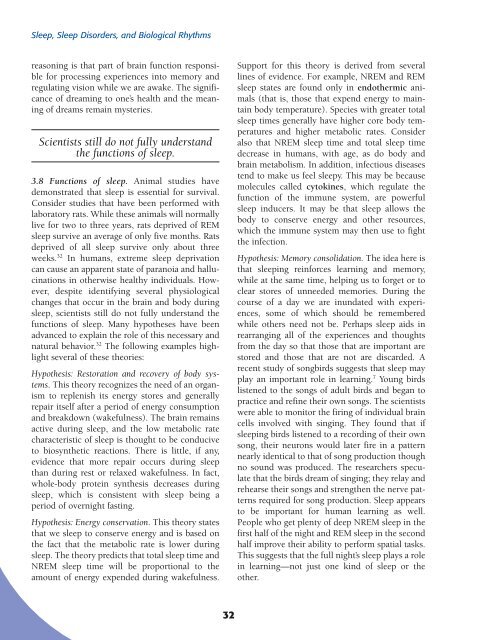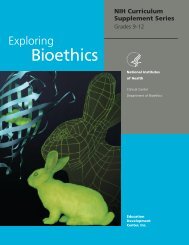Biological - NIH Office of Science Education - National Institutes of ...
Biological - NIH Office of Science Education - National Institutes of ...
Biological - NIH Office of Science Education - National Institutes of ...
Create successful ePaper yourself
Turn your PDF publications into a flip-book with our unique Google optimized e-Paper software.
Sleep, Sleep Disorders, and <strong>Biological</strong> Rhythms<br />
reasoning is that part <strong>of</strong> brain function responsible<br />
for processing experiences into memory and<br />
regulating vision while we are awake. The significance<br />
<strong>of</strong> dreaming to one’s health and the meaning<br />
<strong>of</strong> dreams remain mysteries.<br />
Scientists still do not fully understand<br />
the functions <strong>of</strong> sleep.<br />
3.8 Functions <strong>of</strong> sleep. Animal studies have<br />
demonstrated that sleep is essential for survival.<br />
Consider studies that have been performed with<br />
laboratory rats. While these animals will normally<br />
live for two to three years, rats deprived <strong>of</strong> REM<br />
sleep survive an average <strong>of</strong> only five months. Rats<br />
deprived <strong>of</strong> all sleep survive only about three<br />
weeks. 32 In humans, extreme sleep deprivation<br />
can cause an apparent state <strong>of</strong> paranoia and hallucinations<br />
in otherwise healthy individuals. However,<br />
despite identifying several physiological<br />
changes that occur in the brain and body during<br />
sleep, scientists still do not fully understand the<br />
functions <strong>of</strong> sleep. Many hypotheses have been<br />
advanced to explain the role <strong>of</strong> this necessary and<br />
natural behavior. 32 The following examples highlight<br />
several <strong>of</strong> these theories:<br />
Hypothesis: Restoration and recovery <strong>of</strong> body systems.<br />
This theory recognizes the need <strong>of</strong> an organism<br />
to replenish its energy stores and generally<br />
repair itself after a period <strong>of</strong> energy consumption<br />
and breakdown (wakefulness). The brain remains<br />
active during sleep, and the low metabolic rate<br />
characteristic <strong>of</strong> sleep is thought to be conducive<br />
to biosynthetic reactions. There is little, if any,<br />
evidence that more repair occurs during sleep<br />
than during rest or relaxed wakefulness. In fact,<br />
whole-body protein synthesis decreases during<br />
sleep, which is consistent with sleep being a<br />
period <strong>of</strong> overnight fasting.<br />
Hypothesis: Energy conservation. This theory states<br />
that we sleep to conserve energy and is based on<br />
the fact that the metabolic rate is lower during<br />
sleep. The theory predicts that total sleep time and<br />
NREM sleep time will be proportional to the<br />
amount <strong>of</strong> energy expended during wakefulness.<br />
Support for this theory is derived from several<br />
lines <strong>of</strong> evidence. For example, NREM and REM<br />
sleep states are found only in endothermic animals<br />
(that is, those that expend energy to maintain<br />
body temperature). Species with greater total<br />
sleep times generally have higher core body temperatures<br />
and higher metabolic rates. Consider<br />
also that NREM sleep time and total sleep time<br />
decrease in humans, with age, as do body and<br />
brain metabolism. In addition, infectious diseases<br />
tend to make us feel sleepy. This may be because<br />
molecules called cytokines, which regulate the<br />
function <strong>of</strong> the immune system, are powerful<br />
sleep inducers. It may be that sleep allows the<br />
body to conserve energy and other resources,<br />
which the immune system may then use to fight<br />
the infection.<br />
Hypothesis: Memory consolidation. The idea here is<br />
that sleeping reinforces learning and memory,<br />
while at the same time, helping us to forget or to<br />
clear stores <strong>of</strong> unneeded memories. During the<br />
course <strong>of</strong> a day we are inundated with experiences,<br />
some <strong>of</strong> which should be remembered<br />
while others need not be. Perhaps sleep aids in<br />
rearranging all <strong>of</strong> the experiences and thoughts<br />
from the day so that those that are important are<br />
stored and those that are not are discarded. A<br />
recent study <strong>of</strong> songbirds suggests that sleep may<br />
play an important role in learning. 7 Young birds<br />
listened to the songs <strong>of</strong> adult birds and began to<br />
practice and refine their own songs. The scientists<br />
were able to monitor the firing <strong>of</strong> individual brain<br />
cells involved with singing. They found that if<br />
sleeping birds listened to a recording <strong>of</strong> their own<br />
song, their neurons would later fire in a pattern<br />
nearly identical to that <strong>of</strong> song production though<br />
no sound was produced. The researchers speculate<br />
that the birds dream <strong>of</strong> singing; they relay and<br />
rehearse their songs and strengthen the nerve patterns<br />
required for song production. Sleep appears<br />
to be important for human learning as well.<br />
People who get plenty <strong>of</strong> deep NREM sleep in the<br />
first half <strong>of</strong> the night and REM sleep in the second<br />
half improve their ability to perform spatial tasks.<br />
This suggests that the full night’s sleep plays a role<br />
in learning—not just one kind <strong>of</strong> sleep or the<br />
other.<br />
32

















